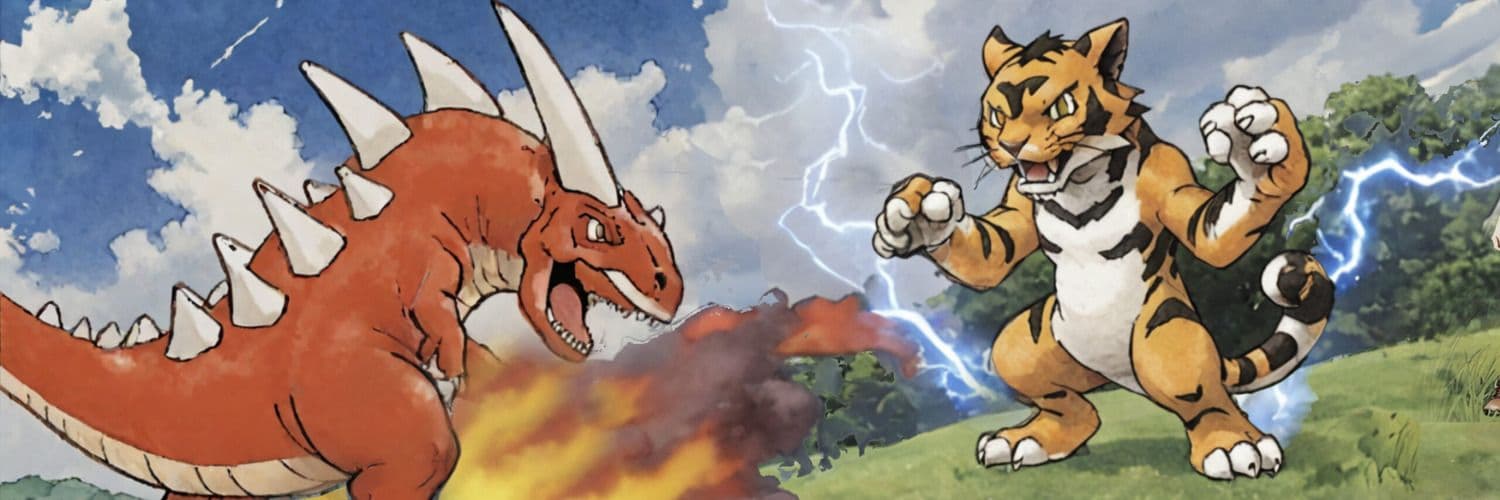Overview
DATAHunter is a free-to-play, browser-based MMORPG set in the fragmented world of Memoria, a floating island formed from the remnants of a shattered Earth. It reimagines the monster-catching genre by combining exploration, tactical battles, and creature training, all while placing a strong emphasis on strategic decision-making and player freedom.

Players can approach the game through two main roles. As Explorers, they roam the world to discover lore, capture creatures, and complete missions. As Strategists, they refine their teams and compete in real-time player-versus-player battles, with the option to bet Solana and climb the leaderboards. Both paths contribute to progression and offer different ways to experience the world of Memoria.
Game Lore
Centuries ago, a catastrophic event known as The Sundering devastated the planet Echo. To preserve life, a chunk of the world was lifted into orbit, forming the floating island of Memoria. Now, centuries later, survivors inhabit this celestial sanctuary, and new threats loom under the surface.

Players begin their journey as young explorers mentored by Sanzu, a wise elder in the town of Stackham. A mysterious prophecy known as "The Gathering" foretells a climactic reckoning, while a shadowy cult manipulates Memoria's fate behind the scenes. As players uncover ruins, ancient texts, and NPC memories, the story of Echo, the Crystal Signal, and the rise of DATA creatures comes to life.
Regions like Javerdale, Nullstone Crag, Rowoods, and Rustvale reveal deeper layers of worldbuilding—from tranquil lakeside towns to dangerous forests where the signal vanishes and creatures can be permanently lost.
Gameplay and Features
DATAHunter combines open-world exploration, team building, and competitive combat. The game is designed around two main approaches to play. In exploration, players move through various zones, catch new creatures, complete quests, and uncover pieces of the game’s lore.

In contrast, the strategic side of the game focuses on player-versus-player combat. Here, players form carefully crafted teams and engage in ranked matches that test their planning and adaptability. Some PvP battles also allow players to wager Solana, adding a competitive edge for those seeking higher stakes.
DATA Creatures
These are the core of the game’s strategy and progression. Each creature has a type, rank, and set of stats. Types influence combat effectiveness in a rock-paper-scissors system, while ranks (D to S) and Matrix Star Ratings (1–5 stars) affect rarity and stat growth.

Key Stats:
- HP– Health
- Attack/Defense – Physical moves and resistance
- S. Attack/S. Defense – System-based abilities
- Speed – Affects move order
- Evasion/Accuracy – Hit and dodge rates
Creatures also have fixed ranks (power potential) and Sync bonuses, which grow the more they’re used in battle. Sync bonuses act as passive buffs and can significantly increase a creature's effectiveness over time.
Catching Creatures
Capturing creatures in DATAHunter follows a familiar but strategic process. First, you need to weaken the wild creature by lowering its HP during battle. Once it's at a manageable level, you can use a DATACard from your inventory to attempt a capture.

The chances of a successful capture depend on several factors. These include how low the creature’s HP is, its rarity, the quality of the DATACard used, and a bit of random luck. If the attempt succeeds, the creature is added to your team. If it fails, the creature remains in battle, and you can try again as long as you have more DATACards.
Leveling and Sync System
Creatures earn EXP through combat and level up like traditional RPGs. Alongside leveling, the Sync System increases the bond between the player and a creature. The more a creature is used, the higher its Sync Bonus becomes, resulting in:
- Faster EXP gain
- Passive stat increases
- Increased late-game potential
This system rewards consistent usage over simply collecting rare creatures. A high-Sync low-rank creature can outperform a rare one with no Sync progress, giving players options beyond just hunting legendaries.
Real-Time Turn-Based Combat
Battles are turn-based but run in real time, requiring players to make quick decisions. Players can bring a team of up to six DATA creatures into combat and swap them mid-battle to adapt to opponents’ strategies. Creature switching is important for countering types and maintaining team longevity.
Permadeath applies if you’re in a no-signal area and your creature hits 0 HP. This creates tension during exploration and PvP, especially if you're deep into a zone and running low on healing options.

Crystal Signal
The Crystal Signal system affects how safe an area is. When the signal is strong, creatures auto-heal after battle. In areas with no signal, defeated creatures are permanently deleted. This adds risk when entering certain zones and forces players to consider whether it's worth engaging in fights or retreating.

PvP and Leaderboards
Once you’ve built your team, you can jump into PvP battles. PvP is real-time and uses the same turn-based mechanics as exploration battles. Players can:
- Compete in ranked matches
- Bet Solana
- Participate in seasonal contests
There’s no pay-to-win angle here, but strong team-building and strategy are essential. PvP rewards dedication to training and understanding the mechanics, especially Sync progression and type counters.
How to Get Started
- Visit the official website and choose between the EU or US server.
- Sign up using your Solana wallet. No download is required.
- After signing up, link your email address. You’ll receive an activation email; click the “Activate Account” button in that message.
- Once activated, return to the website, refresh the page, and you’ll be able to access the game.
- Start in Stackham, the tutorial town. You’ll meet Sanzu, who gives you your first creature.
- The intro tutorial teaches movement, capturing, battles, and the Crystal system. It’s skippable but recommended.








